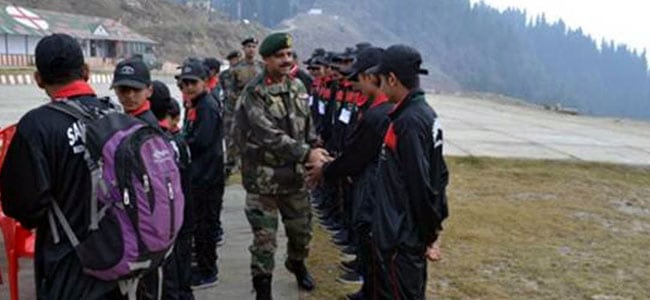Budgam (Jammu and Kashmir): The students of ITI and Polytechnic institutions of Kashmir’s Budgam district visited various industrial centres of Delhi, Noida and Gurugram to include PUSA ITI, Aryabhatta Polytechnic Institute, Army Institute of Management and Technology, Global Institute of Technology, Maruti Udhyog Limited and Hero Limited, as part of a capacity building tour organised by the Indian Army.
During the tour, the students were acquainted to modern day technologies being used by these reputed companies. Counselling sessions on the various courses that were being offered by the institutions were also held, with the intention of making the students aware about career prospects in their chosen vocations.
The tour was a part of the ongoing initiative that the Army has undertaken to improve awareness levels of the students of Jammu and Kashmir.
The initiative elicited a positive response from the locals and did so, in its previous stint too.
Earlier in June this year, a similar capacity building tour was organised for students of ITI Srinagar and ITI Bemina to Chandigarh, Mohali and Ludhiana. The students got an opportunity to visit premier institutions like ITI Ludhiana, ITI Chandigarh, Punjab University and privately-run institutions like Lovely Professional University and Chandigarh University.
“Such tours organised by the Indian Army under its flagship welfare initiative, Operation Sadbhavna, go a long way in enhancing awareness levels of students of Kashmir who do not get much opportunity to visit other parts of the country. It gives to them the confidence to venture out in pursuit of career enhancement,” said Lt. Gen. PS Mehta, who has recently retired from the Indian Army and who is a native of Kashmir.
“The tours spark in the young minds and motivate them to work harder to acquire jobs in such prestigious companies,” added Gen. Mehta
The Army holds a large number of educational, awareness and capacity building tours for various strata of society in Jammu and Kashmir during the winter months. This is the chosen time since educational institutions are closed for the winter break.
While students form a predominant part, the initiative also includes elders and religious leaders who get an insight into the cultural diversity and also exchange views with eminent personalities like political leaders, educationists, professionals in various fields etc. (ANI)
Capacity building tours by Indian Army for Kashmir students elicit positive response

